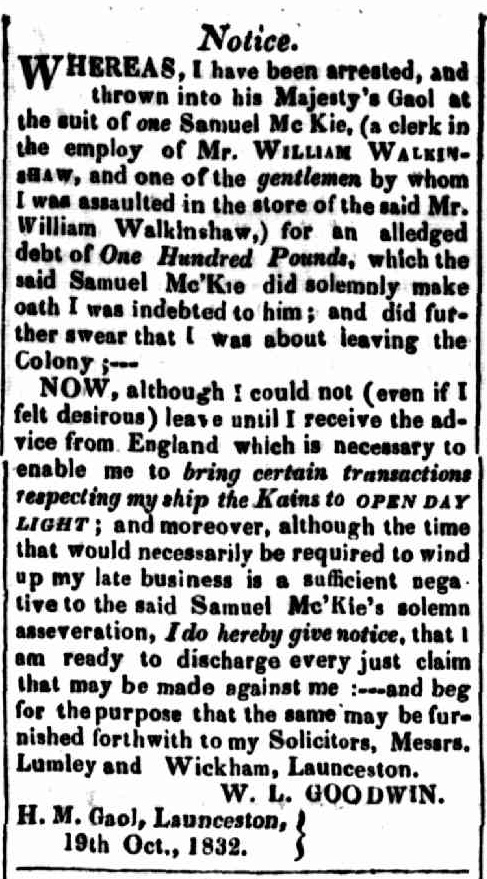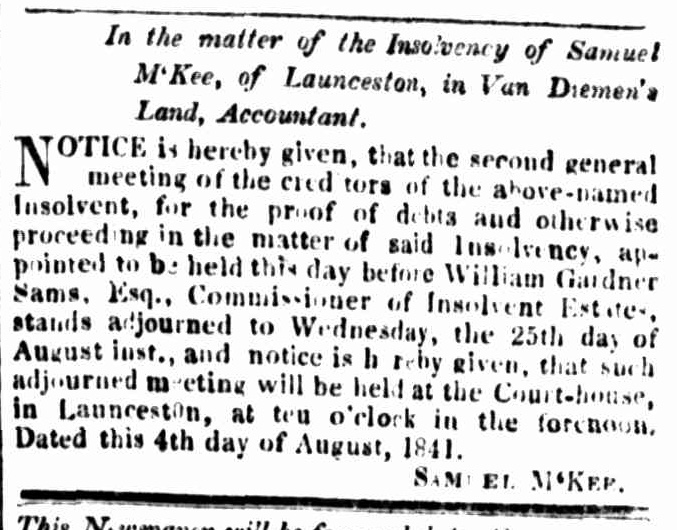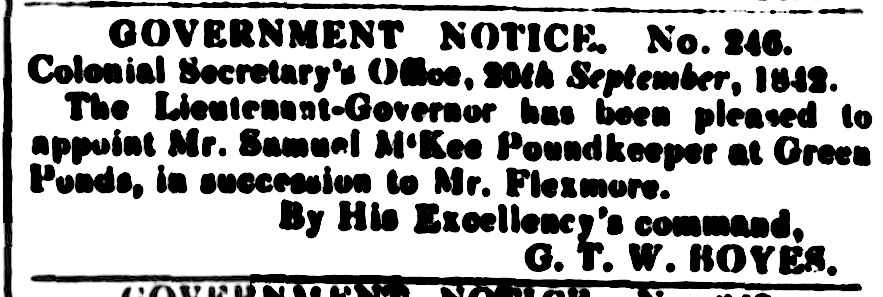Or should that be M’Kie, M’Kee, McKee, McKie, Mackie, Mackay or Mc’Kie? Which variation of spelling you choose to use depends on the year, the season, or the aspect of the moon at midnight.
Samuel McKie (Henceforth to be spelt (McKee) was born about the year 1800 in County Tyrone, Ireland. He married Ann Hall in the Parish of Camus, in the same County on 30 December 1821.
By the year 1830 he was resident in Liverpool, England, prior to immigrating to the Australian Colonies. He did his due diligence — so when he sailed on the barque Brenda with wife, three children and a servant, bound for Van Diemen’s Land as a free settler, he had in his possession a letter of introduction from Downing Street, allowing him authority to apply for land grants in NSW or VDL. This letter was dated 29 January 1831.
There was consternation in officialdom after he arrived in Van Diemen’s Land on 19 December 1831. The land grant rules had been changed, and McKee was no longer eligible for grants under the new rules. McKee did acquire some farm land near the town of Launceston eventually, however whether this was a grant or he had to expend his capital in purchasing the same is unknown.

CSO1-1-618 File Number 14120 (image 2-p80)

He set up at first as a merchant on his own account in Launceston during March 1832. He was still a man of means by this date, for only a few months later he was able to enter a racehorse “Creeper” into the local Race Meeting. (it did not win).
Later that same year his circumstances were so reduced that he was now employed in the store of a Mr William Walkinshaw as a clerk. In January 1833, McKee and several other employees of Mr Walkinshaw were acquitted of assaulting one William Lushington Goodwin over an outstanding debt. The trial excited much public interest:

He applied to purchase some land north of George Town from the government for a commercial venture in March 1835. His application was rejected “Because not in accord with King’s Regulations”
Samuel McKee had many convict servants assigned to him over the years. Unlike so many others, we know the names of more than a few of those assigned to him. As is usually the case, the only reason these names are known is that something went wrong. In the case of McKee, either he hated — or liked them too much.

Bridget Monningham (almost certainly not her correct name) was back in the Female House of Correction in Launceston by the date she gave birth to Samuel MacKee’s daughter. Elizabeth McKee was born 3 August 1836.
(Eighteen years on, this event might be related to a brawl on the Launceston docks when one of McKee’s other children received a £5 fine for defending his sister’s honour.)
…Mr. Rocher for the defence urged that there must have been something behind the curtain to justify the assault, and if the account which he had heard were true, Fisher deserved not only what he had received, but a great deal more. He was informed, that a mob of had followed defendant and his sister all the way from the Cornwall, calling after them and frequently jostling them. …
Launceston Examiner (Tas. : 1842 – 1899) 21 October 1854 page 3
…defendant and his sister were returning on the evening the assault was committed from Ali-Ben-Sou-Alle’s concert, and that on the way home, a mob of fellows bustled and insulted Miss M’Kee. After taking his sister home, Mr. M’Kee, sen., and his son went in pursuit of the persons who had offered the unmanly indignities to the young lady, when they met Mr. Fisher and his witness opposite the Victoria Hotel, where an altercation ensued…
The Cornwall Chronicle (Launceston, Tas. : 1835 – 1880) 25 October 1854 page 5
At the other end of the spectrum was an odious creature by the name of Patrick Matheson:

To the Editor.
SIR, —Having seen in your paper of the 15th instant, a statement of Mr. W. Peel’s, respecting my conduct in the Masterson business, — I beg to offer to you and the public, in justification of my character, the following reply : […]
1st In my service only two hours— Insolence — 10 days solitary confinement.
2nd When three days out of cells — Absconded—two year’s ADDITION— 4th conviction.
3rd. — By Mrs. Mc’Kee — Insolence— reprimanded — in my absence.)
4th— By ditto, ditto, ditto.
5th— By myself- -for being absent without leave — turned into Government, to be made a Messenger. (See Gazette of 10th March last.)
6th— By myself — for being caught in a room in my dwelling-house, concealed under a bed —six months hard labor.
Now, Sir, this is the man Peel says I recommended to be made a constable of. How could I, or any man of reason or common sense be guilty of such a thing, after such a catalogue of offences, and he in my service only two months. […]
I shall let the matter rest for the present, and say no more on the subject, although I could fill a quire of paper on this fellow’s offences. — I am , Sir, your obedient servant,
SAMUEL Mc’KEE.
The Cornwall Chronicle (Launceston, Tas. : 1835 – 1880), page 1
Somewhere in the middle was George Hayle, who escaped punishment for drinking after hours, only due to the good word of his master
Otherwise, McKee was not too fussed about which assigned servant he tussled with. One court case in February 1838 saw him charged with assaulting the (unnamed) assigned servant of a fellow settler named Edward Umphelby.
The unluckiest of McKees’s assigned servants has to have been Thomas Roper. He was reported by McKee at various times for disorderly conduct (25 lashes), Disobedience of Orders, Insolence, and being Out of the house. Roper died in Launceston Hospital on 16 July 1838, still assigned to McKee, aged 42. Reported cause of death: “Visitation of God.”
Samuel McKee was declared insolvent for the first time in March 1839. Since 1837 he had been in the employ of Mr Henry Dowling, sometimes editor and publisher of the Launceston Advertiser. By 1839 at least, McKee was editing Dowling’s paper for him — Which was just asking for trouble:—
Has not Samuel M’Kee, who is so free in his remarks about Goodman Hart—who has shewn the consummate bravery to attack the unhappy fellow after his hands are pinioned and he is prostrate— gone on in his business of a cow-keeper and farmer, ever since, as though he never had been insolvent? Has this renowned and creditable Samuel McKee, Editor of the renowned and creditable Advertiser, ever paid his creditors one shilling ?”
The Cornwall Chronicle (Launceston, Tas. : 1835 – 1880) 5 October 1839 page 2.
Some weeks after this, McKee was notified another convict servant was available to be assigned to his service from the Depot at Launceston. He collected convict James Dyson on 11 November 1839, however barely two months later he returned him to the depot on 8 January 1840. He no longer required his service.
McKee had money troubles throughout 1841 and was declared insolvent again.

By 1842 he was appointed the Government Poundkeeper at Green Ponds (now Kempton, although why you would change such an excellent name as Green Ponds is beyond me). Green Ponds is quite a distance from his property in Launceston, so he must have been desperate for work. In 1843 He was appointed Inspector of Stock in the same district.

He was declared insolvent yet again in April 1845, however his creditors could not be bothered to turn up to court. McKee returned to Launceston where he worked as an accountant or clerk for several businesses.
By the middle of the following decade Samuel McKee was secretary of the lodge of a friendly society in Launceston. His family were grown up and moving to other colonies.
Samuel McKee died at South Yarra in the Colony of Victoria at the age of sixty-eight, on 9 December 1868. His wife Anne died in Melbourne 23 Apr 1887.


Leave a Reply